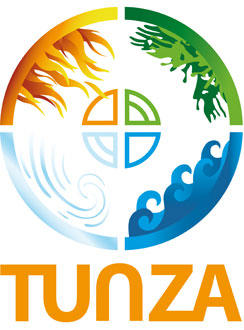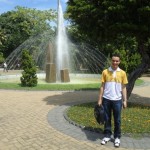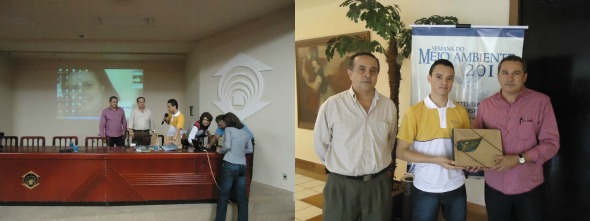Search Results for Tag: Brazil
Climate Champion Iranildo at the International TUNZA Conference 2011
The British Council International Climate Champion Iranildo de Sousa Ferreira was selected by the United Nations Environment Programme (UNEP) to represent Brazil at the TUNZA International Children & Youth Conference on the Environment. The conference starts today.
 Iranildo de Sousa Ferreira was selected from thousands of applicants from around the world. He will be at the TUNZA International Conference in Indonesia until 01 October .
Iranildo de Sousa Ferreira was selected from thousands of applicants from around the world. He will be at the TUNZA International Conference in Indonesia until 01 October .
Iranildo helped to prepare proposals to be presented in the next United Nations Conference on Sustainable Development – Rio +20, and will evaluate the contribution of youth to the International Year of Forests and share his experiences of activism and his work with experts in the environmental area.
TUNZA will be held by the UNEP in collaboration with the Government of Indonesia. It will bring together 1400 children and youth, to discuss their role and inputs to the upcoming United Nations Conference on Sustainable Development – Rio+20. Under the slogan “Reshaping our future through a Green Economy and Sustainable Lifestyle”, the conference will also review the contribution of youth to the International Year of Forests and how they can adopt more environment-friendly lifestyles. The conference themes are Rio + 20 (Green Economy) / Green Lifestyles, Forests, Sustainable Consumption and State of the Global Environment from the youth perspective.
“This is not a time for pessimism or to turn a blind eye to environmental problems. It is time for constructive and decisive action because the alert signal has been given.” Iranildo says.
Secret River

The Amazon is the second longest river in the world, snaking through large parts of South America. But just last week, scientists announced they’ve found another river that’s just as long but much wider – and it’s actually underneath the Amazon.
Researchers from Brazil’s National Observatory say the river, called Rio Hamza, is about 4 kilometers below the Amazon, underground. It ranges between 200 and 400 kilometers in width, while the Amazon is only between 1 and 100 kilometers wide. Rio Hamza starts in the Acre region under the Andes and flows through several of the Amazon’s basins before it empties out into the Atlantic Ocean.
Great find!
1,000 solar roofs in Brazil
This project is all about introducing solar thermal water heating in 500 social housing units in Rio de Janeiro – Solar power is still rarely used in Brazil, despite ideal climate conditions and rising gas and electricity costs. But a new residential complex with solar-thermal water heating is under construction in Rio de Janeiro. City authorities have earmarked the new housing for poor families from the favelas.
more informations at:
GLOBAL IDEAS
facebook
twitter
Iranildo de Sousa Ferreira, Climate Champion from Brazil
Iranildo de Sousa Ferreira – International Climate Champions Brazil was a keynote speaker at Environment Week at the University of Fortaleza (UNIFOR) in Fortaleza, Ceará, June 7, 2011. The theme was “Science and Sustainability”. He spoke on the Scientific Basis of Climate Change: Vulnerability, Mitigation and Adaptation. Iranildo kicked off a rich debate about the main consequences of climate change for the state of Ceará and Brazil.
 The University of Fortaleza (UNIFOR) held its Environment Week on 6. and 7. June 2011. Here I was invited to speak and debate the science of climate change. In my speech I talked about the scientific basis of climate change, using the final report of the Intergovernmental Panel on Climate Change (4AR-IPCC), the recent report of the 3rd WG-IPCC Energy and Climate Change Mitigation and the human contribution to climate change, to show the vulnerabilities, mitigation and adaptation of climate change. I also used the IPCC data and documents of the United Nations Framework Convention on Climate Change – UNFCCC, as well as the advances of the last negotiations at COP 16.
The University of Fortaleza (UNIFOR) held its Environment Week on 6. and 7. June 2011. Here I was invited to speak and debate the science of climate change. In my speech I talked about the scientific basis of climate change, using the final report of the Intergovernmental Panel on Climate Change (4AR-IPCC), the recent report of the 3rd WG-IPCC Energy and Climate Change Mitigation and the human contribution to climate change, to show the vulnerabilities, mitigation and adaptation of climate change. I also used the IPCC data and documents of the United Nations Framework Convention on Climate Change – UNFCCC, as well as the advances of the last negotiations at COP 16.
My speech ended in a debate about the main consequences of climate change in the state of Ceará in Brazil. Based on the scientific data that I used, there will be several consequences for the State of Ceará, especially the increase of extreme events like rising sea level and dryness.

Iranildo conducting discussion with the audience of the Week Environment of the University of Fortaleza - UNIFOR.
Regarding to Brazil, I mentioned that the consequences of rising temperatures will be worse for the North and Northeast of the country, a region that is called one of the hotspots of climate change. It may suffer from drought and decline in its biodiversity, water availability and the increase of extreme events. I also talked about the likely increase in rainfall in Southern Brazil and launching the kit of the UN Decade for Sustainable Development of the Ministry of Environment of the UNESCO Office in Brazil.
When you ask me about what it takes to reduce the effects of Climate Change, I would say that the first thing we should do is to change attitudes towards the issue and get involved in this process that concerns us all. The first tool is environmental education, because we are building our environmental citizenship.
The Environmental Week at UNIFOR was a remarkable moment for me, because after I brought the universities to discuss the issue of climate change, I am now invited by universities to explain and discuss the topic and that is all due to the opportunity to be an International Climate Champion.
It’s getting hot in Mangueira
Immerse into a completely different world! Get into the latest GLOBAL IDEAS interactive multimedia adventure. You will be visiting the people and the streets of the Mangueira neighborhood in Rio de Janeiro. – Mangueira. The Webdocumentary. Coming soon.












Feedback